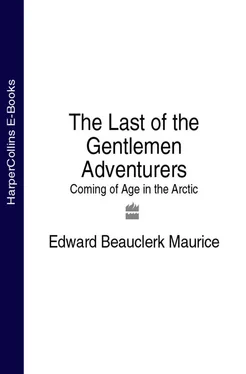Ian and I watched her manoeuvre into midstream and then head out of the harbour, the white pennant of the Royal Mail slapping in the wind at the top of her mast. Down river, the Canadian navy, in the form of two destroyers, dipped flags in salute as she steamed by. Just beside me somebody’s friend had forgotten a last message, bawling out ‘Happy Christmas’ in the forlorn hope of being heard on the ship. We began to understand why they had told us that to think about the Arctic without thinking about the Hudson’s Bay Company was like writing a book about sea without mentioning ships.
A few days after the departure of the Nascopie , the remaining five of us set off quietly for the docks, taking with us all our worldly possessions. By ten o’clock that morning we were assembled in a rather gloomy shed at the city end of the wharf, where the van had unloaded us. The ship on which we were to take passage, the Ungava , was alongside the far end of the wharf, so we had a fair way to go with all our baggage.
One of our party could hardly move, so heavily laden was he with cases and packages, and his crab-like motion attracted the attention of a passing wharfie.
‘Why didn’t you bring your bed, boy?’ the man guffawed. ‘Where the devil are you off to with all that load?’
‘I’m going north for five years,’ came a voice from behind the parcels and cases.
‘Well in five years’ time you’ll either be dead or carrying twice that much on one shoulder,’ shouted the man amid his laughter as he went on his way to the dock gates.
There was no glamour attached to the departure of the Ungava . She was just a rather rusty old freighter, and an ugly one at that, setting off on a more or less routine passage along the Labrador coast. She was heavily laden. Her well decks were completely filled in with drums of oil, so that care had to be taken when passing across them to avoid falling overboard.
There was no one to see us off, apart from a couple of officials from the office, so without any fuss or palaver, about an hour after we had come aboard, the crew cast off the lines and, belching black smoke, like the Nascopie we set off down the river.
The old ship had no licence to carry passengers. We had had to sign on as crew, deckhands, stewards, stokers and the like at a token wage of one dollar per week. I was allocated to a job as ‘assistant purser’, which did not please some of the others, for they considered it to be a cushy task compared to theirs. As it turned out that I had laboriously to type out page after page of bills of lading while they had little to do after a slight scurry of activity in the mornings, they were quite pleased.
Ian and I went out on deck that first evening, making our way perilously over the oil barrels to a space on the stern, from where we could watch the muddy waters stirred up by the propellor and the coastline dropping behind us. We were somewhere between the two cities of Montreal and Quebec, the former just a distant glow on the horizon, the latter not yet visible. Above the hills, the summer lightning forked and flashed and the thunder rumbled distantly. A few lights twinkled on both shores. A small township, stretched along the bank of the great river, drifted by and dwindled into the distance.
We did not speak much. I think we both realized at last that before long the lights of our accustomed world would have faded behind us. Ahead would stretch the vast empty wilderness of the Arctic to which we had so lightheartedly committed ourselves.
II
THE LABRADOR COAST runs in a north-westerly direction, pointing at the top like an outstretched finger across Hudson Straights toward Resolution Island and Baffin Island. The Torngak Range, mountains of the devil, high and menacing, jut out into the straight above Ungava Bay. Straggling still further beyond the mainland, the islands Killineck and the Buttons jostle each other, desolate and barren as if the Almighty, coming to the end of a coastline with a few black and unproductive rocks left over, flung them in one despairing handful into that grey and uninviting sea.
The other end of the coast is less daunting, but still hostile to anyone used to the gentle countryside of southern England. It begins just above the Gulf of St Lawrence and curves round into the Straits of Belle Isle, the strip of water which separates Labrador from the island of Newfoundland. Here, before we had even really entered the northern seas, the elements served up a warning of what we might expect in the higher latitudes.
During the afternoon of the fourth day out from Montreal, the heavy clouds massed threateningly from the north. Slowly they grouped and crept across the darkening sky toward us, then suddenly, just before nightfall, launched their attack. The wind roared down at us, flinging gouts of rain like pieces of metal into the faces of those foolish enough to stray out on deck to see what was happening.
At the height of each gust, the old ship seemed to waver and stop, shuddering helplessly on the crest of the mounting waves, unable to force a passage through the strength of the storm. Then, as the gust slackened, the vessel slid down into the deep beyond, shaking itself free of the holding wind.
Those of us quartered in the after part of the ship were effectively marooned, since to reach the dining saloon and forward parts we had to cross over the barrels with a near certainty of being flung into the sea. The other apprentices did not seem to mind about this, because the pitching and tossing of the ship had removed their interest in food, but I felt deprived at having to content myself with a bar of chocolate for the evening meal.
Any feeling of superiority was quite dispelled during the night, however, for my bunk, which had not been fastened properly to the wall, gave way with the strain of the ship’s movement, flinging me down on to the deck with the mattress and spring on top of me. First aid had to be administered to a gash on my head, necessitating a rather unsightly, bloodstained bandage. My friends thought it much funnier and more undignified that I had fallen out of my bunk (as they soon persuaded themselves) than that they had suffered a bout of seasickness.
Within twenty-four hours the storm calmed almost as quickly as it had risen. We had turned the corner from Belle Isle and were now steaming along the Labrador coast, heading for our first port of call, a settlement called Cartwright.
The harbour was just inside the entrance to a fairly wide bay with an island slanted across the mouth in such a way as to make it almost landlocked. We thought at first that the captain had stopped the ship and dropped anchor to wait until the visibility improved, for all round the vessel there was a low mist stretching to the horizon. Then we noticed straight ahead of us, apparently suspended from the sky, the familiar flag of the Hudson’s Bay Company. Shortly afterwards the fog dispersed sufficiently for us to see that the captain had placed the ship directly in front of the post buildings.
The scenery was not inspiring: a long deep stretch of flat land which looked like marshland or swamp, as if there ought to have been a river delta just ahead of us. We could see no river though, just the flats with some low hills in the distance and, further still, blending almost into the clouds along the horizon but breaking through here and there as a peak or crag, the higher hills of the interior. Just below the buildings, at a jetty pushed out into the bay for about fifty yards or so, a nondescript group of people appeared to be waiting for the Ungava to start unloading.
Dotted across the flats were numerous shack-like erections, with larger single-storey buildings here and there, such as a school and a hospital. The whole outlook was as grey and dull as the day itself, but we soon found that we were not there just as tourists. The group we had seen waiting at the end of the jetty was to come aboard and work in the holds, while we were to go ashore to handle the supplies as they came off the lighters.
Читать дальше












